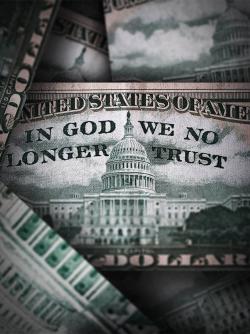What Happened to the Christianity of Christ?
Have you ever wondered why there are so many Christian denominations? Why isn’t there just one Church that everyone can agree upon? Is there anything you should do about this, and have you ever wondered, if there was a true, first-century Christian church, founded by Jesus Himself, what happened to it? What happened to the Christianity of Christ, and where is the true Church of God?
Scripture records that when the Holy Spirit descended upon the first Christians at Pentecost in 31 AD, the Savior’s disciples “were all with one accord in one place” (Acts 2:1). The one message they spoke was heard in multiple languages, and many new believers were converted upon hearing this teaching in a language they understood.
This was the first Pentecost observed by the one Church Jesus Christ founded. Yet, today, there are literally thousands of churches claiming to be Christian. How can one Church become thousands of churches?
Should we be surprised, even shocked? No! Jesus predicted exactly this in His famous Olivet Prophecy, in the very first sign He gave regarding the end of this present age: “Take heed that no one deceives you. For many will come in My name, saying, ‘I am the Christ,’ and will deceive many” (Matthew 24:4–5).
Yes, many do come in His name, calling their religion Christianity but preaching something very different from what He preached. There are even a few imposters claiming to be Christ Himself, but He was really warning that many would proclaim Him as the promised Messiah, the Christ or “anointed one” of God, yet preach contrary to—even against—His true teachings.
Do you know where God’s true Church is today? Can you find it among the thousands of denominations claiming to be Christian? Let’s examine some teachings that many take for granted but that starkly show the difference between Scripture and the false doctrines of so many mainstream churches.
Remembering Christ’s Resurrection
Anyone can do very simple research and prove that Jesus’ Apostles never celebrated any holiday with festive colored eggs and chocolate bunnies. But do you realize that the very notion of “Easter Sunday” itself is nowhere in Scripture?
Remember that Mary Magdalene went to Christ’s tomb on Sunday morning. What did she see? “Now on the first day of the week Mary Magdalene went to the tomb early, while it was still dark, and saw that the stone had been taken away from the tomb. Then she ran and came to Simon Peter, and to the other disciple, whom Jesus loved, and said to them, ‘They have taken away the Lord out of the tomb, and we do not know where they have laid Him’” (John 20:1–2). An angel announced to the women who came to Christ’s tomb that “He is risen” (Matthew 28:1–6; Mark 16:1–6; Luke 24:1–8).
Jesus’ resurrection did not occur on Easter Sunday! In fact, your Bible shows that Christ rose from the grave exactly three days and three nights after His crucifixion. As the Apostle John recorded, “Therefore, because it was the Preparation Day, that the bodies should not remain on the cross on the Sabbath (for that Sabbath was a high day), the Jews asked Pilate that their legs might be broken, and that they might be taken away” (John 19:31). That “high day”—not the weekly Sabbath but an annual Sabbath known as the First Day of Unleavened Bread—began at sunset on Wednesday evening. For Jesus to fulfill the “sign of the prophet Jonah” that He gave in Matthew 12:38–40, He had to remain in the grave for the same three-day-and-three-night period Jonah spent in the belly of the great fish. And He did! He was buried shortly before sunset on Wednesday, and He rose three days later—shortly before sunset on the seventh-day Sabbath!
Some readers get confused about this because the King James Version uses the term “Easter” in Acts 12:4. But any reputable Bible encyclopedia will admit that this is a mistranslation. Notice: “EASTER (AV Acts 12:4). An anachronistic mistranslation of the Gk. páscha (RSV, NEB, “Passover”), in which the AV followed such earlier versions as Tyndale and Coverdale. The Acts passage refers to the seven-day Passover festival (including the Feast of Unleavened Bread). It is reasonably certain that the NT contains no reference to a yearly celebration of the resurrection of Christ” (The International Standard Bible Encyclopedia, ed. Geoffrey Bromiley, vol. 2, p. 6).
Christians kept Passover just as their Savior had, but it now had added meaning as a memorial of Christ’s sacrifice. Remember what the Apostle Paul wrote to Corinthian brethren who were abusing the sacred observance of that day: “Your glorying is not good. Do you not know that a little leaven leavens the whole lump? Therefore purge out the old leaven, that you may be a new lump, since you truly are unleavened. For indeed Christ, our Passover, was sacrificed for us. Therefore let us keep the feast, not with old leaven, nor with the leaven of malice and wickedness, but with the unleavened bread of sincerity and truth” (1 Corinthians 5:6–8).
Christ’s disciples follow the example of His Apostles, continuing to observe the Passover, not the invented and pagan “Easter Sunday.” To learn more, read our informative booklet Easter: The Untold Story.
Weekly Worship—Observing the Sabbath, or Some Other Day?
Most who call themselves Christian take for granted that Sunday is the appropriate weekly day of worship. But did Christ or His Apostles hold weekly worship services on the first day of the week?
Your Bible records that years after Christ’s death, burial, and resurrection, Paul preached to both Jews and Gentiles meeting on the seventh-day Sabbath. After the Jews left, the Gentiles in his audience made a very significant request: “So when the Jews went out of the synagogue, the Gentiles begged that these words might be preached to them the next Sabbath” (Acts 13:42). Paul honored their request: “On the next Sabbath almost the whole city came together to hear the word of God” (v. 44). He did not preach to them on Sunday; he waited until their weekly day of worship—the seventh-day Sabbath!
So, who “changed” the Sabbath day? It was not until the fourth century AD that Rome enforced Sunday-keeping throughout the Roman Empire. Emperor Constantine spent his life as a pagan sun-worshiper, and after entering the Roman church he gave the following edict in 321 AD: “Let all magistrates and people… rest on the venerable day of the sun” (The New Schaff-Herzog Encyclopedia of Religious Knowledge, vol. 11, p. 147, emphasis added).
Just a few years later, leaders of the Roman church declared, “Christians shall not Judaize and be idle on Saturday, but shall work on that day; but the Lord’s day they shall especially honour, and, as being Christians, shall, if possible, do no work on that day. If, however, they are found Judaizing, they shall be shut out from Christ” (A History of the Councils of the Church, vol. 2). True Christans were labeled heretics for keeping the same Sabbath that Jesus and His original Apostles kept! Sabbath worship was effectively outlawed!
Clearly, it was the Roman church that made the change to Sunday worship. But on what authority? Noted Roman Catholic theologian James Cardinal Gibbons plainly admitted that “you may read the Bible from Genesis to Revelation, and you will not find a single line authorizing the sanctification of Sunday. The Scriptures enforce the religious observance of Saturday, a day which we never sanctify” (Faith of Our Fathers).
On this point, we at Tomorrow’s World agree with Cardinal Gibbons: If the Bible is your authority, you have no basis for observing Sunday as your weekly day of worship! But we deny that Gibbons’ church had or has the authority to make such a change! Christ’s original Christianity taught an obedience to Scripture made possible because of the gift of the Holy Spirit. Today’s true Christian Church does the same. Yet there has been an ongoing trend throughout history to mix pagan traditions with Christ’s teachings, even driving His teachings out of churches claiming to bear His name! As historian Will Durant observed in Caesar and Christ, “Christianity did not destroy paganism; it adopted it.”
Other Dangerous Changes
What other changes were deceptively made to the practice of original Christianity? Jesus and His Apostles observed the Bible’s annual festivals and Holy Days. They did not observe the day of Jesus’ birth. Most reputable encyclopedias document the original pagan holidays and celebrations surrounding December 25. One of the major festivals celebrated throughout the Roman Empire was the Saturnalia, in honor of Saturn, god of agriculture. The Encyclopædia Britannica tells us that the Saturnalia…
… became the most popular of Roman festivals, and its influence is still felt throughout the Western world. Originally on December 17, it was later extended to seven days. It was the merriest festival of the year: all work and business were suspended; slaves were given temporary freedom to say and to do what they liked; certain moral restrictions were eased; and presents were freely exchanged. The influence of the Saturnalia upon the celebrations of Christmas and the New Year has been direct (1974, vol. 8, p. 916).
Most scholars will admit that Jesus was born not in the winter but in the fall, in September or October. And just why was He born? The commercial, pagan customs surrounding the winter holiday obscure the very purpose for the Messiah. You can read much more about this in our eye-opening booklet Is Christmas Christian? Few today even know the purpose of Jesus’ birth, though an angel announced it to Mary: “And behold, you will conceive in your womb and bring forth a Son, and shall call His name Jesus. He will be great, and will be called the Son of the Highest; and the Lord God will give Him the throne of His father David. And He will reign over the house of Jacob forever, and of His kingdom there will be no end” (Luke 1:30–33).
The angel said that Jesus would be not just a king, but the King of a kingdom that would never end! And what did Jesus proclaim when He began His public ministry 30 years later? “Jesus came to Galilee, preaching the gospel of the kingdom of God, and saying, ‘The time is fulfilled, and the kingdom of God is at hand. Repent, and believe in the gospel’” (Mark 1:14–15).
Here we see another major difference between the Christianity of Jesus Christ and the many modern counterfeits that use His name. Christ and His Church preached—and continue to preach—the Gospel of the Kingdom of God, the Kingdom that will rule on earth for a thousand years under the King of kings and Lord of lords (Revelation 19:16; Revelation 20:4). You may know of at least one major denomination that says it is now the Kingdom of God on earth. But Scripture shows that the King’s earthly rule over all nations will not be proclaimed until the prophesied seventh trumpet sounds: “Then the seventh angel sounded: And there were loud voices in heaven, saying, ‘The kingdoms of this world have become the kingdoms of our Lord and of His Christ, and He shall reign forever and ever!’” (Revelation 11:15).
Sadly, most who call themselves Christians have overlooked the true good news that Christ preached! He will return as King over all nations on earth! When He establishes His perfect government in His Kingdom, the world will experience peace as never before. And “of His kingdom there will be no end” (Luke 1:33).
What about the “Protestant Reformation”?
Much more can be said about this than we can cover in one short article. If you really want to know how the Protestant Reformation failed to reform mainstream Christianity, which had already far departed from the first-century Church, go to TomorrowsWorld.org for our series “The Plain Truth About the Protestant Reformation,” published in this magazine from March-April 2017 to May-June 2018. Martin Luther, John Calvin, and many others did identify some real problems with Roman Catholic teaching and practice, but in many respects they perpetuated those same problems—and added new ones of their own! The last book in your Bible, the book of Revelation, describes a harlot “mother” church with many harlot “daughter” churches that have in effect prostituted themselves by abandoning Christ’s true teachings. This may sound hard to believe, but you can read the evidence for yourself!
Even in the churches that believe they have reformed from the errors of the Roman church, lawlessness is widely taught and practiced. The Apostle Paul warned the church at Thessalonica, “For the mystery of lawlessness is already at work” (2 Thessalonians 2:7). That same “lawlessness” is taught in today’s churches that want you to believe that Christ did away with the Ten Commandments and that since we are therefore under grace, we can practice lawlessness! But any true follower of Christ understands that grace does not permit us to sin in any way! If you didn’t read “Grace: Freedom to Sin?” in last month’s issue, you can at TomorrowsWorld.org.
Jesus told a rich young man who was seeking eternal life, “But if you want to enter into life, keep the commandments” (Matthew 19:17). Jesus then mentioned several of the Ten Commandments. The Ten Commandments reflect the two great commandments: to love God and to love one’s neighbor. As the late Dr. Roderick C. Meredith wrote in Restoring Original Christianity (pp. 15–16):
In the Sermon on the Mount, Jesus certainly did not “do away” with God’s spiritual law (Matthew 5:17). Rather, He “magnified” the Ten Commandments. He explained that we must not only refrain from killing other human beings, we must not even look on them with contempt or hatred (vv. 20–23), as that is the “spirit” of murder. We are not to “hate” even our enemies. As Jesus said clearly, “But I say to you, love your enemies, bless those who curse you, do good to those who hate you, and pray for those who spitefully use you and persecute you (v. 44).”
Original Christianity is a way of love and a way of life. Dear reader, you need to study your Bible and history. What happened to the original Christianity of Christ? Jesus Christ is today and forever the head of His body, the Church (Colossians 1:18), and He “is the same yesterday, today, and forever” (Hebrews 13:8). The original Christianity of Christ remains spiritually active and is fulfilling the mission He gave to His Church. You need to seek original, biblical Christianity and find the true body of Christ.
By the fourth century AD, different groups were claiming the name of Christianity while adopting non-biblical doctrines and becoming counterfeit denominations. In fact, the “falling away” or “rebellion” (NIV) described in your Bible had already begun in the first century (2 Thessalonians 2:3). The Apostle Paul wrote, “For the mystery of lawlessness is already at work” (2 Thessalonians 2:7).
But true Christianity need not remain a mystery to you, if you study your Bible and follow its teachings. Do you want to follow the Jesus Christ of the Bible, His original teachings, and His way of life? He tells us in Luke 4:4, “Man shall not live by bread alone, but by every word of God.” Jesus said this when the New Testament was not yet written; He was talking about what we today call the Old Testament. If you are going to live by every word of God, you need to read and obey the whole Bible, comprised of the New and Old Testaments!
So, which will you choose? The Christianity of your Bible, or a false religion promoting pagan holidays and lawlessness? You need to seek the truth!






